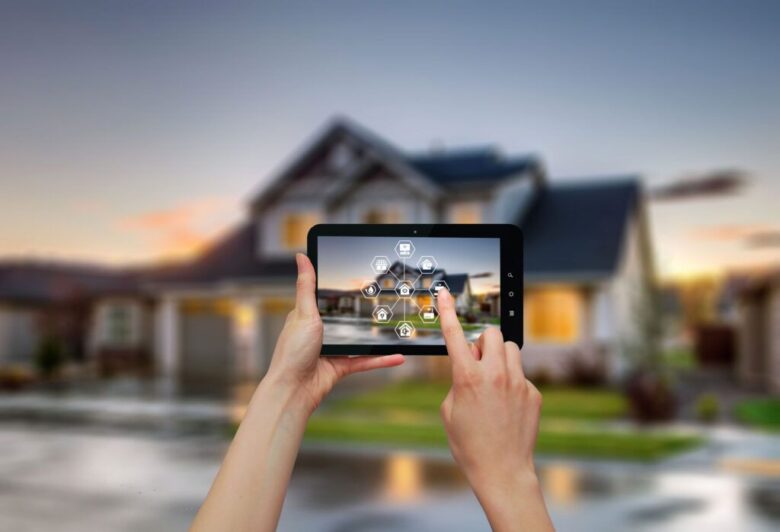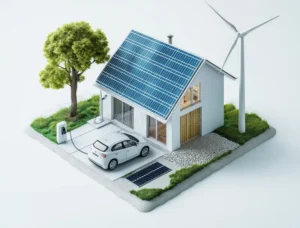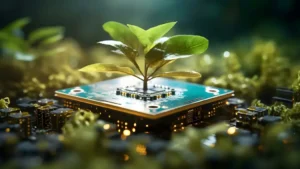Our homes are rapidly changing due to sustainability and digital innovation. LED lighting and water-saving faucets are no longer enough to save electricity. Today’s smart homes use eco-technology to make our homes smarter and reduce their impact on the environment. Smart thermostats, energy-efficient appliances, solar panels, and real-time energy monitoring allow homes to optimize their energy consumption like never before. Eco-technology creates high-tech, eco-friendly living spaces. This development reduces energy bills and improves the environment. This article explores how eco-technology can make homes more responsive, energy-efficient, and sustainable.
The Rise of Smart Home Technology
The eco-technology revolution revolves around smart home technology. Starting with a few smart lighting systems and programmable thermostats, an ecosystem of smart devices has emerged. These devices communicate with each other to learn your behavior and adjust your home environment to save energy. Voice assistants can now control heating, lighting, and home appliances through spoken requests or routines. Smart thermostats can learn your daily habits and adjust the temperature to save energy. These energy-saving technologies offer convenience while reducing a home’s carbon footprint. Smart homes are a testament to how technology can combine comfort and sustainability with eco-friendly design and AI-driven automation.
Real-time Insights into Energy and Usage
Real-time energy monitoring is a major benefit of eco-home technology. Energy monitoring systems can show how much electricity each appliance is using, identify energy-consuming devices, and suggest energy-saving strategies. These systems often come with mobile apps that track energy usage on the go, providing personalized reports and actionable insights. This openness empowers families to make smarter choices, change usage habits, and schedule appliances for off-peak hours. Some advanced systems use artificial intelligence to recommend energy-saving technologies based on your daily activities. You can use this data to make smart, proactive energy-saving decisions. It’s a simple and effective way to save energy.
Smart Lighting and Climate Control for Maximum Efficiency
The largest energy consumption in a home is lighting and temperature control. Fortunately, eco-home technology has improved both areas. Smart lighting systems adjust brightness based on time of day or usage, so lights are only on when needed. You can remotely control them, set up routines, or adjust them based on natural light to reduce energy waste. Smart thermostats are the ultimate in climate control. They adjust heating and cooling based on your lifestyle without wasting energy because they learn your preferences. Some devices can change settings when no one is home. By controlling these systems via a smartphone or voice commands, you can manage your energy usage at home while you are away. These devices simplify life and reduce your energy and utility bills.
Integrating Renewable Energy
Environmental technology is not limited to smart devices but also includes energy production and storage in the home. Solar panels are becoming increasingly popular and affordable for homeowners looking for clean energy. Home battery storage systems allow excess solar energy to be stored for later use, minimizing reliance on the grid and providing backup power during power outages. Smart inverters and energy management systems can maximize solar power and deliver energy where it’s needed or back into the grid. Some systems can sell excess energy to local energy markets, turning your home into a mini power plant. Electricity prices are falling, and homes are becoming more sustainable and environmentally friendly. Eco-technology intelligently manages renewable energy to turn homes into sustainable power plants.
Smart Plumbing: Saving Water
Ecotech also saves water. Smart plumbing systems monitor water usage, detect leaks, and manage irrigation. Smart faucets and showerheads regulate water flow and temperature, saving water without sacrificing comfort. To reduce water damage and waste, leak detection systems send phone alerts. Smart irrigation systems adjust water schedules based on weather and soil moisture to provide plants with sufficient water. These technologies are practical and essential for the environment, especially in areas where water is scarce. By installing these systems in our homes, we can use water more efficiently, reduce our energy bills, and protect one of the world’s most precious resources.
Conclusion
The rise of ecotech is changing modern living. Today, smart, efficient, and sustainable living spaces are the focus, not electronics and automation. Ecotech makes living smarter and greener by regulating energy and water usage, integrating renewable energy, and improving comfort. The home of the future will be able to anticipate and meet our needs, while sustainability becomes a priority as technology advances. Smart and eco-friendly homes are essential to combating climate change and resource depletion. By implementing these advanced technologies today, we can improve our quality of life and create a better world for future generations.
FAQs
1. What is eco-technology in a smart home?
Sustainable, eco-friendly eco-technology can improve your home’s efficiency, energy and water consumption, and environmental performance.
2. How do smart thermostats save energy?
Smart thermostats remember your habits and adjust the temperature based on your schedule, saving energy when you’re away.
3. Are smart appliances worth buying?
Smart appliances use less energy, offer more features, and provide real-time information, which can reduce your energy bills in the long run.
4. Can I monitor my home’s energy consumption in real time?
Of course you can. Many energy monitoring systems provide real-time data via mobile apps, allowing homeowners to track their energy usage and improve efficiency.
5. How does ecotechnology contribute to sustainable development?
Ecotechnology can reduce resource waste, save energy, integrate renewable energy, and ensure that families can live sustainably without sacrificing comfort.




